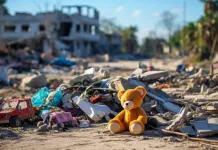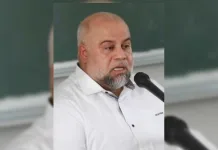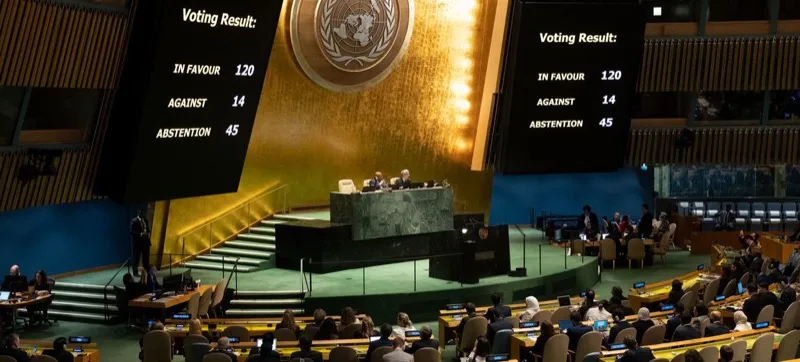
Joining the United States and Israel, Austria, Croatia, Czechia, Fiji, Guatemala, Hungary, Marshall Islands, Micronesia, Nauru, Papua New Guinea, Paraguay, Tonga also voted “No” to the motion for a cease-fire in the Gaza Strip.
The UN General Assembly’s resolution for an “urgent, durable, and permanent humanitarian ceasefire in Gaza” was adopted late Friday after the motion was passed in New York by 120 votes to 14.
The resolution, which urged the cessation of hostilities, was brought by Jordan and co-sponsored by nearly 50 countries, including Türkiye. It called for the unhindered provision of essential aid to civilians throughout the Gaza Strip.
At least 7,703 Palestinians, including 3,595 children, have been killed in Israeli attacks, while the death toll in Israel stands at more than 1,400.
It also called for the rescinding of the order by Israel, the occupying Power, for Palestinian civilians and United Nations staff to evacuate all areas in the Gaza Strip north of the Wadi Gaza and relocate to southern Gaza.
It received 120 “Yes” votes, 44 “abstentions,” and 14 “No” votes, with Israel and the US among those opposing in the 193-member General Assembly. Israel’s Foreign Minister Eli Cohen called the approval “despicable” and rejected it.
The outcome was remarkable for showing the limited direct support for the US, with even France, Spain and the UK refusing to join the US in voting against the motion.
Among the 14 countries that voted against the cease-fire were Israel, the US, Austria, Fiji, Guatemala, the Marshall Islands, Micronesia, Nauru, Papua New Guinea, Paraguay and Tonga.
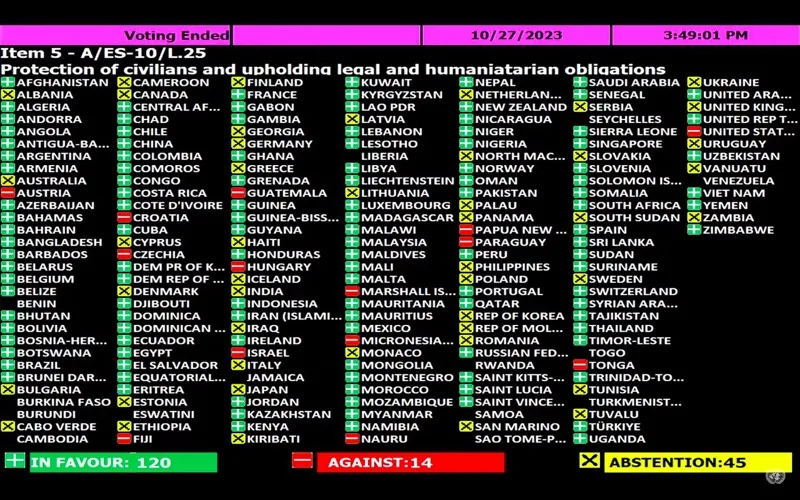
Wight EU members supported the cease-fire, including Belgium, Ireland, France, Luxembourg, Malta, Portugal, Slovenia, and Spain.
Among the 45 countries that abstained, 15 were from the EU, including Germany, Italy, Greece, the Netherlands, Poland, Bulgaria, Greek Cypriot Administration, Denmark, Estonia, Finland, Latvia, Lithuania, Romania, Slovakia and Sweden.
Gaza’s 2.3 million residents are also grappling with shortages of food, water and medicine due to Israel’s blockade of the enclave. Only a few aid trucks have crossed into Gaza since the opening of the Rafah crossing point with Egypt.
In the days leading to the vote, Jordan had adapted its initial resolution in an effort to secure maximum support by dropping its call for a ceasefire in favour of a sustained humanitarian truce, and it had added that the release of “captives” must be unconditional.
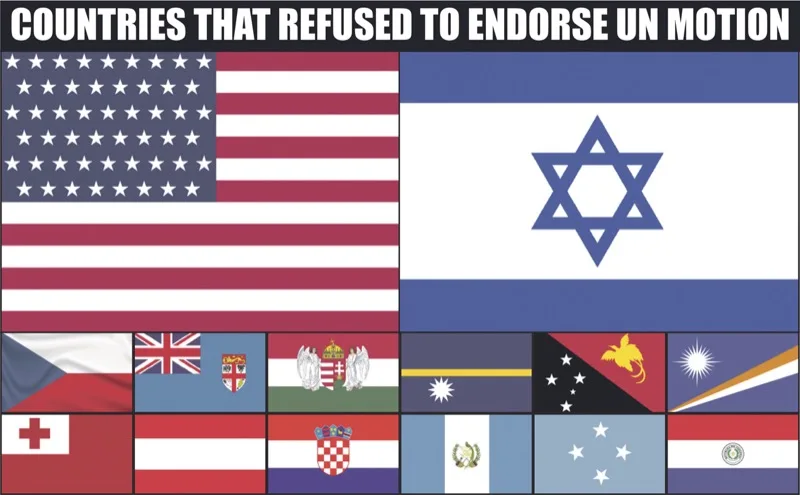
But Canada, with US backing, said these adjustments did not go far enough, since Jordan’s motion did not name Hamas but instead simply condemned “all attacks of violence against Palestinian and Israeli citizens, including all acts of terror and indiscriminate attacks”. It also did not describe the hostages held by Hamas as such, but instead said they were being illegally held as captives.
Jordan was delighted by the outcome, with its foreign minister, Ayman Safadi, saying the general assembly had “spoken for justice”. The resolution, he claimed, “is a clear stand against Israel’s war, against the killing of Palestinians, against war crimes, on the side of international law”.
But the resolution is non-binding, more a snapshot of world opinion. The security council, which can pass binding resolutions, has been unable to pass a motion on the crisis without either Russia or the US wielding its veto.
Calling for the immediate and unconditional release of all civilians who are being illegally held captive, the Assembly also stressed the grave impact that armed conflict has had on women and children as well as on other civilians who may have specific vulnerabilities, including people with disabilities and older persons.
Emphasising the importance of preventing further destabilisation and escalation of violence in the region and calling upon all parties to exercise maximum restraint, the body reaffirmed that a just solution to the Israeli-Palestinian conflict can only be achieved by peaceful means, based on the relevant United Nations resolutions and in accordance with international law and on the basis of the two-State solution.
Riyad Mansour, Permanent Observer for the State of Palestine, said that in the world’s parliament today, peace-loving nations stood up and proved that the international community has not forsaken the promise, purpose and principles of the United Nations and has not abandoned the Palestinian people in these darkest hours. He said he was thankful to all the countries that voted for the draft resolution tabled by Jordan and co-sponsored by 46 countries.


